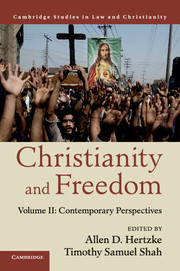Book contents
- Frontmatter
- Colophon
- Contents
- Contributing Authors
- Acknowledgments
- Introduction: Christianity and Freedom in the Contemporary World
- 1 Persecution in the Context of Religious and Christian Demography, 1970–2020
- 2 Patterns and Purposes of Contemporary Anti-Christian Persecution
- 3 Where the Spirit Leads: Global Pentecostalism and Freedom
- 4 Christianity among the Marginalized: Empowering Poor Women in India
- 5 Transnational Christian Networks for Human Dignity
- 6 The Growth and Dynamism of Chinese Christianity
- 7 Christianity and Religious Freedom in Indonesia since 1998
- 8 Christianity and Freedom in India: Colonialism, Communalism, Caste, and Violence
- 9 Vietnam: Christianity's Contributions to Freedoms and Human Flourishing in Adversity
- 10 The Challenge and Leaven of Christianity in Pakistan
- 11 Christianity and the Challenge of Religious Violence in Northern Nigeria
- 12 Copts of Egypt: Defi ance, Compliance, and Continuity
- 13 Between the Hammer and the Anvil: Indigenous Palestinian Christianity in the West Bank
- 14 Christians in the State of Israel: Between Integration and Emigration
- 15 Arab Muslim Attitudes toward Religious Minorities
- 16 They That Remain: Syrian and Iraqi Christian Communities amid the Syria Confl ict and the Rise of the Islamic State
- Index
1 - Persecution in the Context of Religious and Christian Demography, 1970–2020
Published online by Cambridge University Press: 05 February 2016
- Frontmatter
- Colophon
- Contents
- Contributing Authors
- Acknowledgments
- Introduction: Christianity and Freedom in the Contemporary World
- 1 Persecution in the Context of Religious and Christian Demography, 1970–2020
- 2 Patterns and Purposes of Contemporary Anti-Christian Persecution
- 3 Where the Spirit Leads: Global Pentecostalism and Freedom
- 4 Christianity among the Marginalized: Empowering Poor Women in India
- 5 Transnational Christian Networks for Human Dignity
- 6 The Growth and Dynamism of Chinese Christianity
- 7 Christianity and Religious Freedom in Indonesia since 1998
- 8 Christianity and Freedom in India: Colonialism, Communalism, Caste, and Violence
- 9 Vietnam: Christianity's Contributions to Freedoms and Human Flourishing in Adversity
- 10 The Challenge and Leaven of Christianity in Pakistan
- 11 Christianity and the Challenge of Religious Violence in Northern Nigeria
- 12 Copts of Egypt: Defi ance, Compliance, and Continuity
- 13 Between the Hammer and the Anvil: Indigenous Palestinian Christianity in the West Bank
- 14 Christians in the State of Israel: Between Integration and Emigration
- 15 Arab Muslim Attitudes toward Religious Minorities
- 16 They That Remain: Syrian and Iraqi Christian Communities amid the Syria Confl ict and the Rise of the Islamic State
- Index
Summary
EXECUTIVE SUMMARY
This paper presents estimates of the number of Christians facing persecution around the world from 1970 to 2020. The purpose of this analysis is to provide a religious demographic context for discussions about Christianity and religious freedom in the twenty-first century. The paper includes demographic analysis of both the Christians living under persecution and the persecutors.
Paul Marshall's taxonomy of persecution is used to produce estimates of the numbers of Christians living under various kinds of restrictions. Persecution is viewed in the context of the five different kinds of states (Self-Professing Communist States, National Security States, South Asian Religious Nationalist States, Muslim-Majority States, and Western Secularist States), divided into key persecuting countries. Tables track the religious demographics of these states over time (1970–2020) with a special focus on Christian demographics, including blocs and movements (e.g., Roman Catholics, Protestants, Evangelicals, Renewalists) and Christian traditions (e.g., Lutherans, Presbyterians, Baptists).
If one excludes Western secularism as a special but not comparable kind of persecution, then it can be said that about 500 million Christians (22 percent of the global total in 2010) are living in states in which they are subject to persecution. An additional 208 million live in Western Secularist States, where they might face discrimination. Altogether 708 million Christians (31 percent of the global total in 2010) live in the fifty-four countries identified in Marshall's taxonomy. The number of Christians living under persecution appears to be increasing. It should be noted that in 1970 more than 152 million Christians lived in the forty-six states where they were subject to persecution. This represented more than 26 percent of all Christians at the time, a higher percentage than that of 2000, when 405 million living in these states represented just above 20 percent of all Christians. By 2020 this is expected to rise to 600 million, or 23.5 percent of all Christians. This shows that persecution, measured by the countries in the taxonomy, is affecting an increasing proportion of the Christian community in the period 2000 to 2020.
Orthodox Christians have experienced a disproportionate amount of persecution. This was especially true for much of the twentieth century, when the rise of communism in the former Soviet Union subjected millions of Orthodox believers to severe persecution.
- Type
- Chapter
- Information
- Christianity and Freedom , pp. 13 - 57Publisher: Cambridge University PressPrint publication year: 2016
- 1
- Cited by



